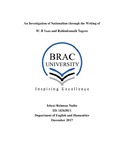| dc.contributor.advisor | Mahbub, Dr. Rifat | |
| dc.contributor.author | Nadia, Ishrat Rahman | |
| dc.date.accessioned | 2018-03-06T07:07:16Z | |
| dc.date.available | 2018-03-06T07:07:16Z | |
| dc.date.copyright | 2017 | |
| dc.date.issued | 2017-12 | |
| dc.identifier.other | ID 14363011 | |
| dc.identifier.uri | http://hdl.handle.net/10361/9578 | |
| dc.description | This thesis is submitted in partial fulfillment of the requirements for the degree of Master of Arts in English, 2017. | en_US |
| dc.description | Cataloged from PDF version of thesis. | |
| dc.description | Includes bibliographical references (pages 48-49). | |
| dc.description.abstract | Nationalism is a complex term, torsade with the forces of colonial and postcolonial witness. It is a quite difficult idea to be explained, as today every nation bears the sense of nationalism but not everyone is getting the same right and space. Time to time the idea emerge with many new additions and develop the base of the concept. This paper aims to study nationalism through the history of culture and literature.
Rabindranath is the emblem of Bengali nation but still regarded as an anti-nationalist. Who always stands for his own people but there is no abrogation for people belong to any other country, religion and nation. Again, Yeats is representing both Ireland and England. In the late nineties there was a radical change all over the world. The powerful countries became one another’s rival. Colonial rulers were threatened by the rise of the revolutionary nationalist. The whole world came to a tumultuous situation. Both Rabindranath and Yeats concentrated on that part of the human history. Their nationalist perception turned into a new direction. It is because of the aggressive nationalistic view of that time.
So, when the nationalism became an activity, and took a homicidal and gusting frame both Rabindranath and Yeats move aside. But their conception of nationalism is not nailed upon on nationalism and antinationalism rather it goes furthermore. Which is the main concern of this paper. In the process of making the world “my own” “our” we are making our life critical. This constant argumentative statement will also have examined by the ideas given by Rabindranath and Yeats. | en_US |
| dc.description.statementofresponsibility | Ishrat Rahman Nadia | |
| dc.format.extent | 49 pages | |
| dc.language.iso | en | en_US |
| dc.publisher | BRAC University | en_US |
| dc.rights | BRAC University thesis are protected by copyright. They may be viewed from this source for any purpose, but reproduction or distribution in any format is prohibited without written permission. | |
| dc.subject | Indian | en_US |
| dc.subject | Western | en_US |
| dc.subject | Nationalism | en_US |
| dc.subject | Antinationalism | en_US |
| dc.subject | W. B Yeats | en_US |
| dc.subject | Rabindranath Tagore | en_US |
| dc.title | An investigation of nationalism through the writing of W. B Yeats and Rabindranath Tagore | en_US |
| dc.type | Thesis | en_US |
| dc.contributor.department | Department of English and Humanities, BRAC University | |
| dc.description.degree | M.A. in English | |

